730: Circuit Diagram
| Circuit Diagram |
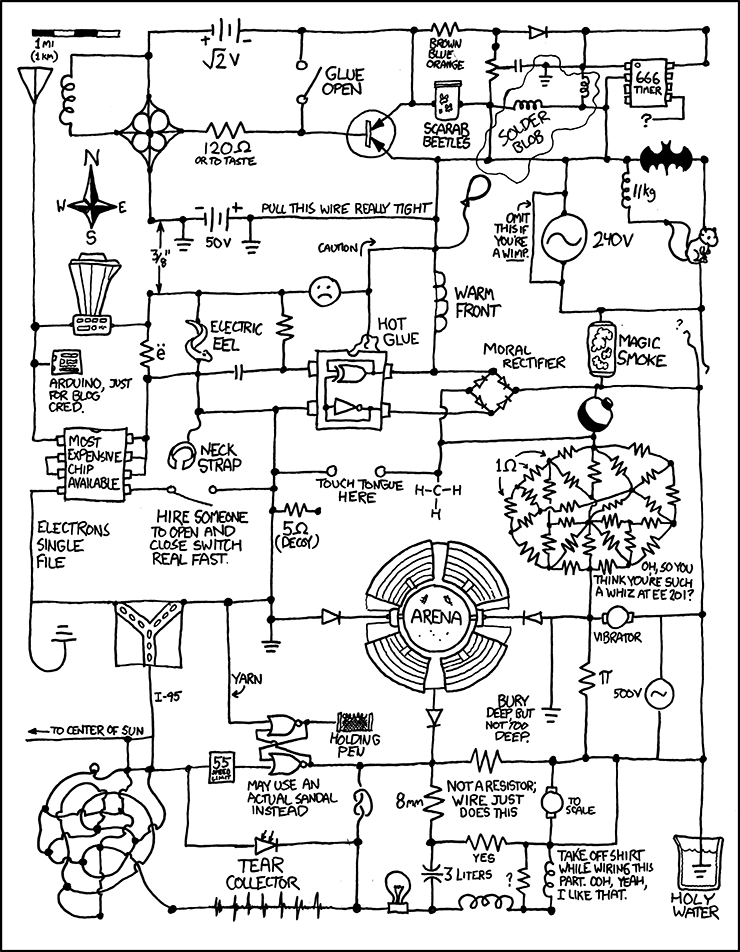 Title text: I just caught myself idly trying to work out what that resistor mass would actually be, and realized I had self-nerd-sniped. |
Explanation[edit]
Another fine example of nerd sniping, as mentioned in the title text. There are pieces of circuit diagrams, road maps, chemical diagrams, and other things all mixed in. Explanations for each below!
| Image Fragment | Image Location | Description |
|---|---|---|
| |
106×37 @ 19,25 | A map scale. Lists kilometers and miles as equivalent. (And makes the diagram many miles wide.) |
| |
40×85 @ 15,62 | An antenna. Typical of radio receivers or transmitters. Or the Turtle in LOGO programming language. |
| |
41×87 @ 53,60 | A coil or inductor. Normal, but unlabeled. |

|
85×93 @ 107,86 | A cloverleaf interchange or junction is a feature of road networks that does not belong in a circuit diagram. Of course, other types of junctions are important in electronics.
A cloverleaf junction has previously been used in 253: Highway Engineer Pranks. |

|
87×63 @ 184,12 | A battery. The voltage of square root of two is strange, but getting about 1.41421... volts is not unheard of. This could also indicate an RMS voltage, although this is unlikely given that this is a DC power supply and not an AC generator. The marked polarity is also the reverse of what is implied by the symbol (where the larger terminal is positive). |

|
94×71 @ 187,110 | A 120 ohm resistor is normal enough. "Or to taste" is odd for a circuit diagram and more like instructions from a recipe, e.g., "1 tbsp tomato purée, or to taste". |

|
90×63 @ 283,50 | A normal switch, with a notation to glue it open. Reminiscent of the MAGIC/MORE MAGIC switch. |

|
69×64 @ 337,101 | A bipolar PNP transistor, except that it has two emitters and no collector. It also resembles one of the schematic symbols for a DIAC, except the arrows are backwards. |

|
79×107 @ 52,141 | Compass points. A map feature, not a circuit feature, but possibly useful given the circuit is many miles wide. |

|
63×58 @ 415,18 | A normal resistor, labeled with color code. Brown-Blue-Orange would be 16000 ohms. Resistor color codes are for reading the value on the physical device itself. They would not normally be shown on the circuit diagram, where it's much easier to just write the number, e.g. 16K. |
| |
42×32 @ 517,14 | A normal diode. |

|
73×74 @ 615,55 | A chip. The normal timer is a "555". "666" would be the number of the beast in Rev. 13:18. The pin connected to "?" is the CTRL pin on a normal 555 timer, which would typically be connected to ground (via a decoupling capacitor) if used at all; the implication here seems to be that it would be connected directly to Hell itself. |
| |
69×41 @ 632,138 | A Batman logo. |

|
75×71 @ 650,211 | A squirrel, or perhaps a wire bent into the shape of a squirrel. Squirrels are among the leading causes of disruptions to electrical grids, so having one as part of a circuit is inviting disaster. Squirrels also appear in past and future xkcd comics. |

|
54×53 @ 606,165 | A coil or inductor. An inductor in an AC circuit is analogous to a mass in an oscillating mechanical system; rather than listing the coil's inductance, the measurement of an analogous mechanical element is given: 11 kilograms of mass. However, the mass could also be the mass of the wire used, which would be a lot of winds. |

|
99×59 @ 538,209 | A 240-volt AC generator (or other power source). |
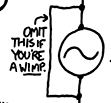
|
111×103 @ 483,186 | A shorting wire around a generator. The label reads "Omit this if you're a wimp." If this wire is included, it will quickly melt - or worse.
Theoretically, wimps will omit the wire, and people who know this fact will also; the only people who would willfully include it are those who feel that putting on a show of toughness outweighs actual logic. |

|
57×75 @ 419,78 | A jar of scarab beetles. Possibly a conflation of a Leyden jar, that is an actual very old-style electrical/electronic component, and something like a killing jar or other insect-collection equipment. Or even, due to the traditionally Egyptian beetles, a repurposed canopic jar. |
| |
28×44 @ 482,47 | A variable resistor with center tap. Normally, there would be an arrowhead on the center tap. |
| |
22×27 @ 507,53 | A normal capacitor. |

|
96×62 @ 577,318 | "Magic Smoke" is the legendary stuff that all circuit components require to function. This is why all components cease to function after releasing smoke. When an electrical component is subject to excessive current it often fails due to heat. This heat is often accompanied by a burning smell and smoke, right at the moment that the circuit fails. Hence the joke that the reason that the circuit failed is that "the magic smoke that makes it work has been released." |

|
51×66 @ 669,315 | Some frayed or dangling wires. The wire on the left seems confused because it did not manage to cross with the one on the right. |
| |
58×48 @ 567,392 | A float, which is used in fishing to control the depth of the attached line. This might actually complete the circuit, depending on the design, as the hooks are metal and may be connected by the same spring to provide the tension to secure fishing line to the float. |

|
111×86 @ 458,336 | A bridge rectifier, which would normally turn alternating current at the top and bottom into direct current on the left and right. In this case, it is labeled as a "moral rectifier". This is presumably a play on the idea of moral rectitude – it makes your circuit more moral. Why this matters in a circuit is unclear. |

|
80×85 @ 423,259 | This resembles both the schematic symbol for part of a transformer and the meteorological symbol for a warm front, which is a feature on a synoptic weather map. |

|
54×52 @ 190,199 | A normal 50-volt battery. |

|
89×56 @ 173,200 | A battery is grounded on both sides. Something will melt or burn out quickly, unless these are separate "earth ground"s, in which case the ground might get a bit cooked. |
| |
174×25 @ 259,198 | Text reads "Pull this wire really tight". This kind of physical-property issue may indicate a high-frequency radio device. Or, given the absurdity of the context, it's a silly reference to a "high tension wire." |
| |
41×91 @ 141,211 | A specified 3/8-inch separation. This probably indicates a carefully controlled capacitance issue. Also contradicts the scale of the drawing, by which the distance shown would be about 0.8 miles (1.28748 km) or 0.8 km (0.4971 miles), depending on which interpretation of the given scale you choose. |

|
92×59 @ 173,309 | An electric eel. This may be an effective power source in the circuit, capable of producing a shock at up to 600 volts and 1 ampere of current (600 watts), but for less than 2 ms. |
| |
35×41 @ 266,307 | A normal resistor. |
| |
34×29 @ 222,358 | A normal capacitor. |
| |
44×40 @ 130,335 | A normal resistor, labeled "ë". This may be a play on Euler's Number, which doesn't normally have a tréma or an umlaut. Alternatively instead of being an umlaut or tréma it may indicate the second derivative of e with respect to time in Newton's notation, in which case, as e is a constant, the resistance of this element is zero. |

|
61×92 @ 65,249 | Our best guess is that this is a blender. Due to the scale, this would certainly be the worlds largest blender. Record setting blenders are not typically part of computer circuits.[citation needed] |

|
115×73 @ 20,342 | An arduino, labeled "Arduino, just for blog cred". May refer to the fact that inexpensive, easy-to-integrate single-board computers like the arduino, which have contributed to the rise of Maker culture, are used and discussed frequently in that culture, and the use of one might impress readers. The comment implies that an arduino is not otherwise needed in this circuit, although it is necessarily hard to tell, given the other components of the circuit. |

|
118×82 @ 39,423 | A chip labeled "Most expensive chip available". The small curve at the top is a part of the packaging designed to show its orientation. Noting that the most expensive real-world chips (in typical production) tend to be those with hundreds of connectors (e.g. around 50 pins emerging from each of the four sides of a square housing), for practical bandwidth and connectivity reasons, rather than this normally inexpensive style of dual in-line package component. Though possibly this particular chip is the most expensive one because of how it well it internally operates, despite working within the practical restrictions of an 8-pin design. |

|
91×50 @ 159,428 | Labeled "Neck Strap", which could be piece of torture or execution equipment, or to restrain the hired hand flipping the switch below. May also be a reference to the grounded wrist straps people working with electronics commonly wear, to prevent accidental static discharges from frying the circuitry. |

|
110×88 @ 147,480 | A switch labeled "Hire someone to open and close switch real fast." Possibly meant to perform the function of an oscillator in a more hackish manner. Could also be a reference to Maxwell's Demon. |

|
61×64 @ 273,498 | A 5 ohm resistor labeled "(decoy)". One end is not attached to anything. Perhaps this indicates wishful thinking that electrons might be tricked into entering this part of the circuit despite the fact that there's nowhere for them to go. |

|
103×56 @ 307,453 | A pair of contacts, labeled "Touch Tongue Here". Could be referring to the practice of daring someone to touch their tongue to the contacts of a 9V battery. |
| |
45×45 @ 301,270 | A frowny-face in a circle which is usually used to denote components without dedicated symbols, such as a voltmeter or an ammeter. |
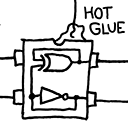
|
128×124 @ 294,311 | A small integrated circuit. The lower gate is an inverter, wired as a free-running oscillator. The upper gate is an XOR wired to act as either a free-running oscillator or a latch. Since the XOR will be slower than the inverter, the overall output of the upper gate is probably very chaotic. Two "input" wires are not connected at all. An additional wire is attached to the top with hot glue, which could act to control static electricity and electrical leakage. |
| |
91×25 @ 302,235 | A caution sign at a curve. Another road feature in the circuit. This is a play on the notion that 90-degree corners on printed circuit board traces can disrupt signal integrity. |

|
67×68 @ 401,455 | A methyl group (chemistry) attached to a corner. If the circuit were an organic chemical, it would be reasonable to find a number of these. |
| |
43×93 @ 453,167 | A balloon, possibly blowing in a breeze. |
| |
22×43 @ 572,68 | A coil or inductor. |
| |
42×20 @ 508,96 | A coil or inductor. |
| |
22×31 @ 534,61 | A ground connection. |
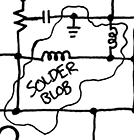
|
134×140 @ 472,49 | A solder blob covering a portion of the circuit. Normally, this would not be part of the circuit diagram, but a mistake in building the circuit. |
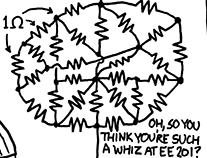
|
207×158 @ 493,443 | A rat's nest of 1 ohm resistors. It is labeled "Oh, so you think you're such a whiz at EE201?" The name EE201 (Electrical Engineering 201) follows US course naming conventions for what appears to be a basic level course in electrical engineering (compare the term 101), which would include being taught how to calculate the effective resistance of various resistor networks. Performing the calculation by hand on a network this complex would probably be very difficult; by computer-assisted methods its resistance can be computed as 93755/121051 ohms (approximately 0.77451 ohms, not a very friendly number!).
A grid of 1 ohm resistors has appeared earlier in 356: Nerd Sniping, a comic also referred to in the title text. |
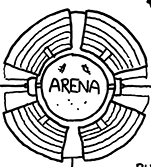
|
232×200 @ 315,533 | An arena, with a few bodies in it. Note the direction of movement enforced by the surrounding diodes, "two men enter, one man leaves", a film reference. |
| |
47×51 @ 569,653 | A "pi" ohm resistor. |

|
75×70 @ 610,655 | A 500-volt AC generator. The wiring to the right shorts out this generator. |

|
85×64 @ 481,682 | A ground connection, labeled "Bury deep, but not too deep". This type of ground connection is called an "earth ground" The "too deep" part might be a reference to Moria in Lord of Rings. The dwarves dug too deeply and disturbed a Balrog. See also comic 760: Moria. |

|
75×73 @ 17,610 | A ground connection at the end of a curve, looking like a fishhook. This could mean being "earth[ed] down under", which is a phrase used to refer to Australia or the southern hemisphere. |
| |
66×45 @ 206,662 | A length of "wire" is labeled "yarn". This would make it a terrible conductor. |

|
93×88 @ 102,590 | The flux capacitor from Back to the Future. This may be difficult to implement, since flux capacitors are not available to most people,[citation needed] and connecting one to power may cause time travel or time distortions in the local area. |
| |
54×24 @ 138,685 | A road sign for Interstate 95, which is the main north-south highway on the east coast of the United States, running from Maine to Florida. |
| |
134×36 @ 12,713 | A connection labeled "To center of Sun". A 93-million-mile or 150-million-km circuit is rather large.[citation needed] |
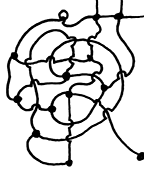
|
144×177 @ 31,753 | A rat's nest of wires. Everything winds up being connected. May also be a parody diagram of an undirected graph(archive), from graph theory. |

|
97×61 @ 22,513 | A label reading "Electrons Single File". If this happens, the resistance in this section of wire would be rather high. |
| |
29×39 @ 256,619 | A ground connection. |
| |
58×46 @ 589,600 | A vibrator, which would be a motor with an off-center weight attached to it. |

|
74×52 @ 532,779 | A motor, labeled "To Scale". This indicates that the physical size and shape of the motor must match the size of the parts around it, or is consistent with the specified scale of the drawing. |

|
73×109 @ 662,822 | A ground connection, in a beaker labeled "Holy Water", possibly creating holy ground. |
| |
48×55 @ 197,740 | A sign indicating a speed limit of 55 MPH. This is a rather typical road sign, but inappropriate for a circuit diagram. It is presumably referring to the speed of individual electrons, which can normally vary up to almost the speed of light - although based on the width of the wire and assuming about 1A of current, the average speed of all electrons, the drift velocity, is likely to be in the order of 10-17mph. |
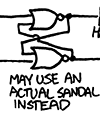
|
100×116 @ 238,706 | A pair of NOR gates wired as a SR (set-reset) flip-flop. The label reads "May use an actual sandal instead", which is a play on the meanings of the term "flip-flop". Also,the gate looks like a sandal. |

|
70×54 @ 322,708 | A pen usually used to hold animals in via a fence enclosure. |
| |
42×49 @ 339,777 | A simple overhand knot, which would have pretty high resistance due to its characteristic pretzel shape. |
| |
149×33 @ 191,889 | This appears to be an electrocardiograph (ECG) trace, but not the sort that would be seen in a healthy person. If this were a real ECG trace, the absence of large, clear P waves might indicate fine atrial fibrillation, but in some recording configurations, P waves are sometimes lost in the noise anyway. Additionally, without a time scale to tell us the ventricular heart rate, it is impossible to make a strong educated diagnosis of any hypothetical disease at all. If we assume it is atrial fibrillation, it is not clear if Randall intended this, or if he is just not familiar with how a normal ECG should look. Lastly, we should throw all of these findings out of the window, as it does not appear that this is an actual ECG machine, but simply a bent wire, much like the "Not a resistor" label nearby. |

|
82×68 @ 223,826 | A photodiode, labeled "Tear Collector". A photodiode is a light-sensing device. |
| |
49×68 @ 373,859 | A lamp. This is not the symbol used in electrical circuits, but a drawing of a lightbulb. |
| |
65×32 @ 450,887 | A coil or inductor. |

|
120×72 @ 537,847 | A coil or inductor, labeled "Take off shirt while wiring this part. Ooh, yeah, I like that." Stripping while wiring plays on the more mundane action of stripping a wire. |
| |
34×41 @ 504,860 | A resistor labeled "?". Presumably this means the resistance is unknown. |
| |
55×38 @ 459,828 | A resistor labeled "YES". Likely another improper unit - a reference to boolean values YES (TRUE) and NO (FALSE). Depending on the limits of a circuit, a resistor would still have a YES boolean value. Possibly indicating that this is a real resistor, as opposed to the one above it in the circuit, labeled "not a resistor." This may also be a reference to the question: "How much INSERT OBJECT HERE do you want?, Yes.", "yes" meaning all of the items or an infinite amount |

|
58×53 @ 389,774 | A resistor labeled "8 mm". Resistance is measured in ohms, and while it might be useful to specify the dimensions of a component to be used (usually on an actual assembly template, or other written documentation, rather than upon a connectivity diagram) the lack of required resistance rating/acceptable range adds far more doubt. |

|
93×84 @ 443,747 | A resistor labeled "Not a resistor; wire just does this". Apparently the wire is or must be physically bent into a zig-zag shape, which would not serve much useful purpose in a low frequency or DC circuit, or perhaps it reflects the fact that any wire has a certain (small) amount of resistance just by being a wire. In a high frequency circuit this can be actually useful, as the shape and length of the transmission line alters the impedance of the line. (Example) |
| |
82×24 @ 415,863 | A symbol for a feedthrough capacitor, labeled "3 Liters". Probable word-play on "capacity/capacitor." Also similar to the symbol for an orifice or flow restriction used on plumbing or hydraulic diagrams, in which case the "3 Liters" might mean 3 liters per minute or per second. |
Transcript[edit]
- [In the upper left corner there is a map scale, labeled with 1 mi (1 km).]
- [Underneath the scale is a circuit diagram with the following items connected:]
- An antenna symbol.
- A blender.
- An Arduino, labeled with "Arduino, just for blog cred".
- A chip, labeled "Most expensive chip available".
- A symbol for an inductor.
- A pattern that looks like a highway cloverleaf.
- A battery symbol (with the + and - symbols on the wrong ends) with a value of √2V.
- A resistor symbol label "120Ω or to taste".
- A switch that is labeled "glue open".
- A transistor with two emitters, one P and one N, and no collector.
- A jar of scarab beetles.
- A resistor labeled "brown blue orange".
- An unlabeled resistor with a center tap.
- A capacitor.
- A diode.
- A ground.
- An inductor.
- An another inductor.
- The two inductors and ground are all covered by a "solder blob".
- A "666 timer" that has pin 5 going into a question mark.
- A compass rose.
- A battery, labeled 50V, with grounds on both sides.
- A long horizontal wire that is labeled "pull this wire really tight".
- An AC source that is labeled 240V, shorted out, with a label on the short "Omit this if you're a wimp."
- An inductor that is labeled with "11kg".
- A Batman symbol.
- A squirrel.
- A wire that is labeled as a distance 3/8".
- A 50V battery.
- A frowny face.
- A vertical wire with a 90 degree bend labeled "caution".
- A balloon.
- An inductor symbol with a line on the bottom edge labeled as "warm front".
- A resistor labeled "ë".
- An electric eel.
- A capacitor.
- An unlabeled resistor.
- A gob of hot glue attached to a chip with an inverter hooked to an XOR gate, both with feedback into each other.
- A neck strap.
- A bridge rectifier labeled as "Moral rectifier".
- A bottle of magic smoke.
- A fishing bobber.
- A broken wire labeled with a question mark.
- A vertical wire labeled with "electrons single file".
- A switch labeled "Hire someone to open and close switch real fast."
- A contact labeled "touch tongue here".
- A resistor labeled "5Ω (decoy)" with only one terminal connected.
- A methyl group attached to a wire.
- A complex mesh of 1Ω resistors labeled with "Oh, so you think you're such a whiz at EE201?"
- A wire labeled "electrons single file".
- A wire bent in a U shape with an upside-down ground on the end.
- A flux capacitor with the bottom wire labeled "I-95".
- A wire labeled "yarn".
- An arena with two diodes going in and one leaving.
- An anode labeled "Bury deep, but not too deep."
- A motor labeled "vibrator".
- A resistor with a value of π.
- A 500V AC source.
- A wire that leads out of frame with a label "to center of sun".
- A 55 MPH speed limit sign.
- An SR latch (flip-flop) labeled "may use an actual sandal instead".
- A holding pen.
- A wire in a knot.
- A resistor labeled "8mm".
- A resistor symbol labeled "not a resistor; wire just does this".
- A motor symbol labeled "to scale".
- A tangled mess of wires connected and jumping over each other.
- A photo diode labeled "tear collector".
- A wire in the shape of a ECG.
- A light bulb.
- A capacitor-looking symbol labeled "3 liters".
- A resistor labeled "yes".
- An unlabeled inductor.
- A resistor with a question mark as a label.
- An inductor labeled "Take off shirt while wiring this part. Ooh, yeah, I like that."
- A ground symbol immersed in a beaker of holy water.
Trivia[edit]
This is one of the six footer comics featured in the bottom segment of xkcd.com.
Discussion
So, is the arena a new kind of comparator or something? Davidy22[talk] 13:28, 18 February 2013 (UTC)
11:13, 10 April 2013 (UTC)11:13, 10 April 2013 (UTC)Jh6p (talk) The 3 liter capacitor could also be a ball approximately 6 inches in diameter if the seams on the ball were similar to the seams on a basketball. Perhaps a volleyball?
- "A squirrel. What it does as a circuit element is unsure."
Perhaps an allusion to a squirrel cage? Wwoods (talk) 18:51, 22 April 2013 (UTC)
- The shape of the squirrel's tail reminds me of a hysteresis curve, although this is admittedly a bit of a stretch. —Scs (talk) 16:02, 17 November 2013 (UTC)
The 'to scale' motor would be about half a mile wide. Powering the rabbit on Gaia's vibrator (also included)? --StarChaser Tyger (talk) 08:40, 22 June 2013 (UTC)
I beg to differ on the flux capacitor thing, as cool as it sounds. Since it is right above the I-90 notation, it is more likely a fork in the road (notice the road stripes indicating that you can pass at any point in the fork). 97.87.12.114 02:15, 24 June 2013 (UTC)
- Oh, I'm pretty sure it's a flux capacitor. Compare some of these images. Yes, there are several road references in this comic, but an electronic reference (especially to a fictional electronic component!) makes more sense. Also I've never seen a Y-shaped highway intersection that looked quite like that (and especially not on an interstate). —Scs (talk) 14:52, 17 November 2013 (UTC)
I have wasted 4 hours on the puzzle, and after wasting 9 pages of A5 paper, the resistance of that terrible resistor mess worked out to be exactly 25265/33783 ohm, or about 0.74786135 ohm. --KopaLeo 199.48.226.89 15:16, 27 June 2013 (UTC)
I think that the "fishing float" might actually be a picture of an ordinary push switch (similar to foot switches used on standard lamps). 87.194.171.29 16:12, 10 July 2013 (UTC)
Isn't the "YES" resistor a reference to the anecdote of how John Lennon and Yoko Ono met? That's what I thought when I saw it, but then, I kinda like The Beatles a bit. 200.70.22.74 12:27, 16 September 2013 (UTC) Another alternative for the "YES" resistor is a pun: if one was being resistant to an idea you would expect to get "NO' from them. This resistor however says "YES". 172.70.127.53 07:39, 8 March 2023 (UTC)Verisimilidude
I think the attempt to explain every single piece of the comic is rather silly. The humor largely draws from the absurdity of the diagram, and that can probably be summarized without going into detail about the possible references of each individual component. 199.27.130.180 03:22, 26 November 2013 (UTC)
- I disagree. The joke works on multiple levels, both the absurdity of the circuit, and the smaller parts of which it is comprised. Hydroksyde (talk) 02:40, 21 April 2014 (UTC)
- The whole point of this website is to explain the jokes behind the comics, so that people who don't get it will be able to get it, or people who don't understand something mentioned in the comic will understand what the thing is. It is very common to go into a lot of detail guess who (if you desire conversing | what i have done) 05:19, 16 February 2025 (UTC)
I concur with KopaLeo - I got the same answer for the resistance of the grid of resistors - about 0.748 when rounded. What a problem! --techdude 108.162.215.65 20:45, 1 January 2014 (UTC)
I feel like I should point out that putting a ground connection in holy water probably creates Holy Ground 108.162.212.197 11:36, 26 March 2014 (UTC)
- Might also be a reference to demineralised (demin - holy) water toby1 (talk) 03:10, 12 January 2023 (UTC)
To center of Sun could possibly be another map reference. 108.162.250.202 01:08, 19 November 2014 (UTC)
The 'moral rectifier' seems like it's built of diodes which prevent current flow to the left, which might mean it's making the current 'more right'? with right being a synonym for moral? 108.162.212.18 00:15, 17 December 2014 (UTC)
- 3L capacitor
The capacitor reminded me of a time I asked my dad why desktop PCs (the kind we could afford at the time were 200-500 W) couldn't have capacitors to protect them from 1-second or shorter power interruptions without the cost of a UPS. He said such a capacitor would have to be as wide and tall as a 2L pop bottle. (He didn't say how much it would weigh.) Promethean (talk) 04:38, 9 September 2014 (UTC)
Where did the claim that the EKG is atrial fibrillation come from? At best it it hard to tell without a time scale what the ventricular rate is, but there is no evidence of extra P waves between QRS complexes that I see. If the diagnosis is made based on the absence of P & T waves, keep in mind that some recording conditions make those (especially T) hard to see. In an Einthoven's triangle arrangement, they might not show up at all above the noise. If we had a time scale that let us calculate ventricular rate, we might be able to conclude supraventricular tachycardia, but I'm hesitant to make a strong claim that this is abnormal at all given that it's hand drawn and we have no scale.Djbrasier (talk) 21:07, 22 January 2015 (UTC)
Does this really belong in Category:Charts? I'm moving it to Category:Maps instead. gijobarts (talk) 21:38, 19 February 2015 (UTC)
Are we really explaining "vibrator" as "a motor with an off-center weight attached to it"? 141.101.91.97 06:51, 13 March 2015 (UTC)
I just spent 3 hours trying to work out the resistor nest. I was unsuccessful. Mikemk (talk) 05:32, 19 March 2015 (UTC)
I did an LTSpice simulation or the resistor mess. It looks like the 25265/33783 ohm answer above is correct. It drew 1.3371463 amps from a one volt source. 108.162.215.133 (talk) (please sign your comments with ~~~~)
Based on Randall's promotion of international standards (such as ISO 8601), it seems odd that he's using the US zigzag symbol for a resistor, rather than the IEC rectangular one. Walale12 (talk) 21:37, 17 April 2015 (UTC)
Looking at the label "Tear Collector" I think it refers to the heartbeat below it, not the symbol above, suggesting that a heart (or heart break) is a likely source of tears. 108.162.216.44 (talk) (please sign your comments with ~~~~)
I'm not sure why the rat's nest of resistors is considered such a difficult problem. I would like to respectfully point out that by far the easiest way to solve it is by assuming a constant current through the network. You can then assign a name to each of the nodes, set one of the end nodes to 0V, and solve by KCL. Granted, there are 13 unknowns and 14 equations, but it still took less than 30 minutes to complete since they are all 1st order! archerator Archerator (talk) 04:57, 30 August 2015 (UTC)
120×72 @ 537,847: the coil symbol next to "Take off shirt while wiring this part. Ooh, yeah, I like that." is similar in appearance to chest hair in stylized comic strips. Thaledison (talk) 17:19, 5 October 2015 (UTC)
144×177 @ 31,753 - Could the rats next of 1 Ohm resister be a reference the the sign that Blackhat holds up in: https://xkcd.com/356/ as you can't show an infinite numbers of 1 ohm resistors in the diagram? 141.101.98.108 (talk) (please sign your comments with ~~~~)
To me, the arena calls to mind the one in the Labyrinth in the Percy Jackson book series. One of the figures resembles a centaur, which was a gladiator that was defeated in said arena in the scene it is introduced. 108.162.245.46 22:16, 30 October 2016 (UTC)
And here I was thinking that the fishing float was a Pokeball... Whoop whoop pull up (talk) 19:03, 28 April 2017 (UTC)
I think that "take off shirt while wiring this" could be sexual reference- there is "ooh, i like that"
- I always thought that the 555 timer was called so because of the three 5k ohm resistors...apparently it is a myth! Does anybody know the real reason?
Regarding the resistor part - I read http://mathworld.wolfram.com/ResistanceDistance.html and implemented it in Mathematica. g = Graph[{1 <-> 2, 1 <-> 3, 1 <-> 4, 1 <-> 5, 2 <-> 3, 2 <-> 6, 3 <-> 6, 3 <-> 7, 3 <-> 8, 4 <-> 7, 4 <-> 5, 5 <-> 9, 5 <-> 10, 6 <-> 12, 6 <-> 11, 7 <-> 12, 7 <-> 11, 7 <-> 13, 7 <-> 14, 7 <-> 9, 8 <-> 15, 8 <-> 10, 9 <-> 14, 10 <-> 15, 11 <-> 12, 11 <-> 13, 13 <-> 14, 14 <-> 15}]; m = KirchhoffMatrix[g] + 1/15; inverse = Inverse[Table[m[[i, j]], {i, 1, 15}, {j, 1, 15}]]; omega[i_, j_] := inverse[[i, i]] + inverse[[j, j]] - 2*inverse[[i, j]]; omega[1, 13]. The result was 167294/195327 = 0.856482...
I feel that it needs to be electronic eel more than an electric one.
Ok, who the hell did the explanation for Magic Smoke? I even had to make a [REAL Citation needed] sign to indicate that the needed citation wasn't a joke.108.162.242.21 15:02, 4 November 2019 (UTC)
Isn't it 616 not 666 citation[1]--Galactic ascencion (talk) 07:32, 17 March 2020 (UTC)
- Well the image clearly shows a 666. Also the wikipedia article you use as a citation here, states also both numbers. The number should be most famous (at least to people who do not follow the bible/quran word by word and to specific translation) due to its use by iron maiden in the song "the number of the beast" which also states it as 666, and other pop culture references. --Lupo (talk) 10:10, 17 March 2020 (UTC)
Could wimp also stands for weakly interacting massive particles, a candidate of dark matter? Then it will reasonably omit the electromagnetic interactions running in this circuit diagram.--Lamty101 (talk) 14:13, 2 July 2020 (UTC)
- Balloon
The line of the balloon also crosses another circuit, which could be a hazard in itself (flying kites or balloons near high-voltage lines is quite dangerous, and helium-filled balloons are often forbidden in railway stations with overhead catenary). This may also be what the "caution" arrow is indicating. 162.158.159.73 13:14, 22 January 2022 (UTC)
- By my reading, the ballon is anchored at the junction between the caution-bend and the vertical one. I think there's danger of the balloon rising to touch the solder-blob, or other bits above it, but I think its already electrically bonded at the non-balloon end (insofar as 'reality' can be interpreted). Yes, there's possible danger (and you IRL point is true) but it's elsewhere, if not almost everywhere else..! 172.70.162.77 15:34, 22 January 2022 (UTC)
While I won't revert this minor 'correction', I disagree that it was wrong before. "Types of junction" is a plural-phrase already. "One type of junction" vs. "(Two/Many/No) types of junction". (It is the type(s) that is/are singular/plural, what they then are of is similar to a postpositive adjective, but in propositional form. "Types of junctions" reads clunkily.
Caveat: I am approaching this as British English (I hope!) but I extensively looked to see if this was one of those cases* US English differs and failed to find anything at all about it. * - by complete fluke, I wrote "this was one of those cases", which could have been "one of those cases which was", where the plurality agreement does not not ask for "were". Well, except in a certain dialect ("He were, she were, they were, we were ...") not far from another area that goes the other way ("He was, she was, they was, we was, ..."), but that doesn't help matters. ;) 172.70.86.68 16:05, 23 January 2022 (UTC)
- Pi resistor
It was conjectured but unconfirmed that the constant "4 times pi" was once called omega. As the pi resistor in the comic was missing the "Ω" symbol, this "pi" may be a pun on "0.25Ω" to the power of [citation needed]. The "e with dieresis" may also be related. --ColorfulGalaxy (talk) 17:04, 12 January 2023 (UTC)
- 3 liters
Might the "3 liters" label on the feedthrough be a joke on how "feedthrough" can be misread as "feed trough"? Bicorn (talk) 03:01, 23 November 2025 (UTC)
- "Hire someone to open and close switch real fast."
As an electronics student in Easter Europe, I have heard a couple of professors who, when talking about oscillators or power amplifiers or anything requiring a switch which periodically opens and closes, would hand-wave the particular structure and real functioning of that component (only representing it as a switch in circuit diagrams) by saying that "you can hire an (old) Chinese man to open and close it for you really fast", as a joke.
Have any anglophone electronics students or engineers heard any similar phrases, and if so, could they have inspired this section of the image? RoAwesomeFace (talk) 13:37, 8 January 2026 (UTC)